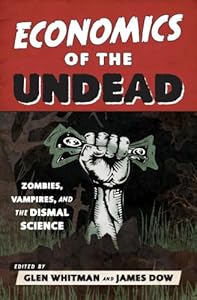Christine Dougherty’s book Zombie, Inc. tells the story of a private security corporation that (as told by one Amazon reviewer) “hunts down zombies, provides security against zombies, conducts research on zombies, as well as providing hundreds of jobs for the people who live in the city. On the theory of safety in numbers, the survivors long ago took over the abandoned high-rise apartments surrounding the company headquarters. Everyone sought jobs at Zombie, Inc., a nice take on the old company-store that kept workers poor in the early 1900s.”
I haven’t read the book (I only became aware of it last week), but I can’t resist sharing some premature thoughts on the plausibility of the premise. I admit I was skeptical at first. There’s no particular reason to think that zombie wrangling would be a monopoly, or even an oligopoly. The most important raw material — zombies — would be readily available, maybe too available, making it difficult for just one company to corner the zombie market. I also don’t see great economies of scale in zombie capture and zombie confinement. It’s possible that a single company might have proprietary technology or a government-granted monopoly, but absent those things, I suspect zombie wrangling would be a relatively competitive market.
However, the above analysis is premised on a particular vision of the zombie invasion — one in which, after the initial panic, zombies remain an ever-present threat (much like cancer and car accidents) but otherwise society returns to something like the status quo ante. But as described in the review, Dougherty’s book seems to imagine a full-scale zombie apocalypse having occurred in which huge numbers of people have died and most social institutions have collapsed. (Again, this is only my inference.) In that situation, we should expect to see groups of survivors banding together in relatively closed communities in the aftermath, such as the town of Woodbury in The Walking Dead. Zombie, Inc. plausibly suggests that a private security corporation might form the nucleus for such a community — and as such, it might operate as a de facto government as well as a profit-making enterprise. Given a much-reduced population and the danger of traveling long distances, it could be very difficult for people to leave one community for another, especially if communities are wary of new arrivals. For that reason, the corporation/government would face little competition, making the “company town” analogy apt.
But I’ll need to read the book before I can say whether the story actually makes sense in these terms. In any case, it seems to be one of the few novels that explicitly deals with the economics of the undead, so I feel I should give it a premature endorsement for that reason alone.


July 15th, 2014 at 6:20 am
I’ve actually read this book (Zombie Inc). It is kind of tongue in cheek, amusing. Not the greatest book I ever read, but one of those books you continue to read because you want to find out what happens next. Somewhat different take than the usual TEOTWAKI Zombie Lit. Quick read.